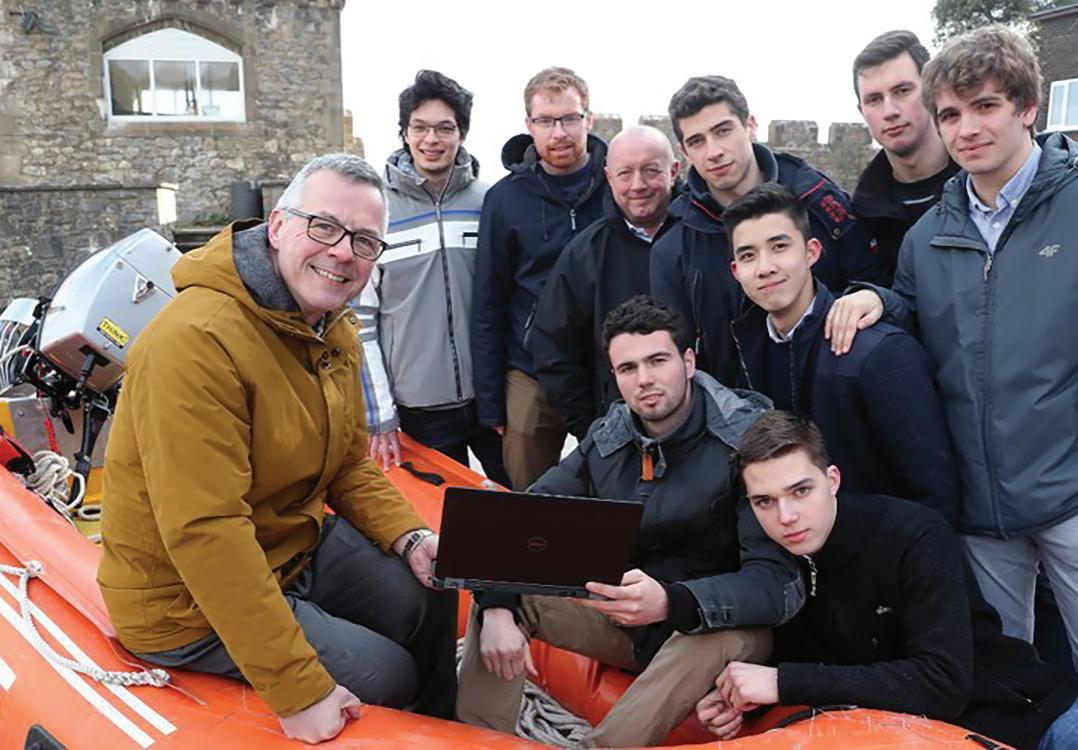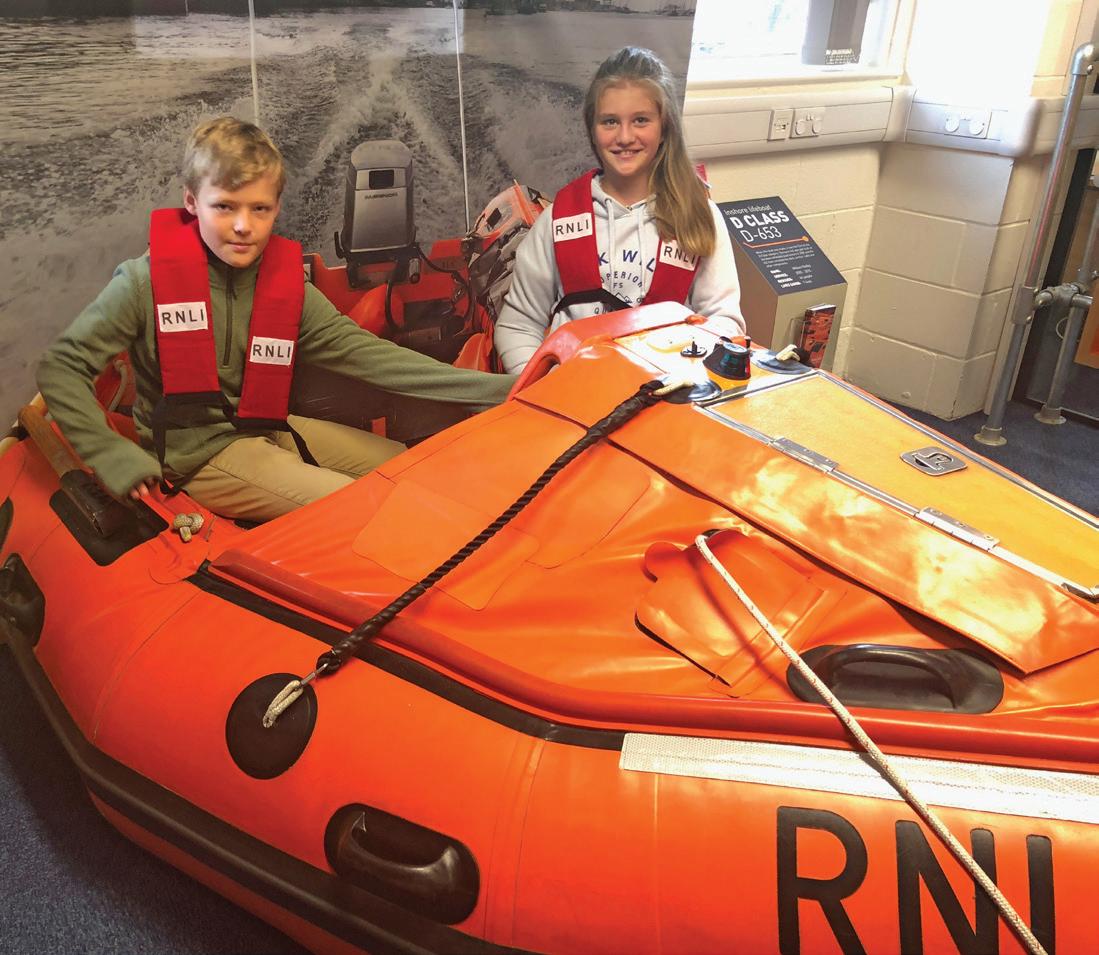
6 minute read
Saving lives at sea, UWC Atlantic College
Modern world Saving lives at sea UWC Atlantic College and Rolls-Royce work together to save lives at sea
A group of United World College students have been working with Rolls-Royce engineers to lay the foundations for a collaborative project which aims to design and develop new technologies that could save lives at sea.
Seven students at UWC Atlantic College in south Wales have been developing their ideas for new marine technologies, such as scouting drones, which could aid the search and rescue process at sea, alongside three of Rolls-Royce’s most experienced marine specialists.
The ideas were born from the students’ personal experiences of working on the rigid hull inflatable boat (RIB) – the world’s most widely used craft for inshore rescue, developed and tested in the 1960s by Rear-Admiral Desmond Hoare, the College’s founding principal, in collaboration with College students. The early RIB X craft were built and test-driven along the dramatic Bristol Channel coastline by Atlantic College students. Now known as the Atlantic Class, the design that developed from the original ‘X Alpha’ prototype revolutionised maritime rescue worldwide and became the model for RNLI inshore boats across Britain. UWC Atlantic College is recognised as the founding member of the global United World Colleges education movement and the development of the RIB commenced shortly after the College’s opening at the 12th century St Donat’s Castle near Llantwit Major in 1962. The patent for the RIB was created by Desmond Hoare who donated it to the RNLI for £1 in 1973. A copy of the still uncashed cheque hangs framed on a wall at Atlantic College.
Having experienced the difficulties of searching for and rescuing people in trouble at sea at first hand in the course of their College service and lifeguarding training programme, the project team felt driven to come up with new solutions to aid the process, utilising their knowledge of drones and unmanned aerial vehicle technology in combination with artificial intelligence (AI).

UWC Atlantic College’s collaboration with Rolls-Royce is part of its commitment to forging relationships between education and industry, as the College plans to develop a new 21st century diploma pathway in collaboration with the International Baccalaureate. Impressed by the students’ ideas and enthusiasm, Rolls-Royce assigned a team of marine engineering specialists to collaborate with the students and help transform their ideas into reality.
Simon O’Connor, a marine engineer in Rolls-Royce’s naval business, Bernard Twomey, regulatory development lead (marine), and Don Murray, senior vice president (manufacturing), travelled to the College to work with some of the students to develop systematic approaches to solving problems faced by search and rescue teams at sea. Each year, the 360 Atlantic College students who come from more than 90 different countries spend ‘Project Week’ participating in co-curricular and experiential activities as part of their UWC education programme.
Erol Balkovic, 18, from Bosnia and Herzegovina, a secondyear student involved with the project said: ‘In our first year at UWC Atlantic College, we had the opportunity to experience real search and rescue missions aboard the RIB. It can be incredibly hard to find what, or who, you are looking for in those conditions. One of our ideas revolves around the idea that technology can essentially become the eyes and ears of a search and rescue team, pinpointing the location of a person or boat in trouble and making the entire process more efficient. This could help save lives otherwise lost at sea. This mentoring opportunity with Rolls-Royce allowed us to develop our ideas. It was an eye-opening session for us, and we cannot wait for the next one.’
The day included discussion around topics such as automation and physics, and the group also considered the materials and manufacturing processes that could be utilised when turning their ideas into physical products.
Rolls-Royce is committed to advancing science, technology, engineering and maths (STEM) subjects among the engineers of tomorrow. Its work with UWC Atlantic College forms just one part of its ambition to reach six million young people by 2020.
Simon O’Connor said: ‘We’ve worked with students at some of the UK’s top universities focused on marine engineering and naval architecture. The ideas, problem-solving approaches, and knowledge of these students at UWC Atlantic College is akin to what we would expect to see at undergraduate level and, in some instances, even postgraduate level.’
Don Murray, who is one of the Rolls-Royce STEM Ambassadors in the UK, said: ‘They think without boundaries – nothing seems unachievable – and their enthusiasm for the subject is extraordinary. If this level of skill and work ethic can be demonstrated in a college environment, then these individuals will certainly excel as they progress to third-level education.’
Bernard Twomey added: ‘Many of their ideas are unique, completely new to the industry. It was a pleasure to help them take those ideas further, and we are looking forward to seeing how the collaborative project unfolds.’
Modern world
Commenting on the project, Peter T Howe, principal of UWC Atlantic College, said: ‘From the development of the RIB all those years ago, to the potentially ground-breaking ideas coming from the students on this project, UWC Atlantic College has a rich history of contributing to lifesaving at sea. These students have been passionately involved in co-curricular activities such the lifeguarding course we run alongside the RNLI – our students can be found safeguarding nine beaches across Wales in the summer – and it’s great to see them taking those experiences to the next level.’
UWC Atlantic College was founded in 1962 by Kurt Hahn. Its approach to learning is based around three simple principles – innovation, opportunity and outreach – which it strongly believes makes education a force for good in the world. UWC is a global educational movement with the mission to make education a force to unite people, nations and cultures for peace and a sustainable future. UWC has 17 schools and colleges on four continents, the majority of which focus exclusively on the 16-19 year-old age group, a time when young people’s energy and idealism can be guided towards empathy, responsibility and lifelong action.
&THERE HERE
If you have news of topical interest, however brief, for ‘Here and There’, please email it to Tom Wheare at tom. wheare@gmail.com. Items should not exceed 150 words. Good colour photographs are also welcome.

St Swithun’s helps student fundraise for 4 A student at St Swithun’s in Winchester is well on her way to raising £214,000 for an RNLI lifeboat. 12 year- an RNLI lifeboat in memory of her mother old pupil Eleanor Scougall successfully nominated the RNLI appeal as one of the school’s three charitable causes for the year and has helped to organise activities to fund the boat, which will be named after her mother.
Eleanor, who is in year 8, has been campaigning and fundraising for the RNLI since her mother died from cancer in 2015. When the family decided to create something tangible to commemorate her mother’s life, a lifeboat was the obvious choice. Her grandfather volunteered for the RNLI for 40 years.
‘The project has been a very positive experience for me,’ said Eleanor. ‘I have learned some good fundraising skills and managed to confront my fears when I spoke in front of 500 people at school and 100 at the charity ball we organised. I have also realised the power of the supportive, kind and energetic community at St Swithun’s.’
Eleanor’s initiative has raised £156,000 so far, with more activities planned. The donations will provide a new B class Atlantic 85 inshore lifeboat which will be stationed in Lough Ree, Ireland and is to be named the Tara Scougall, in honour of Eleanor’s mother. The boat will be built at the RNLI factory in East Cowes next year and is expected to be on service at the Irish lifeboat station at the end of 2019.
Headmistress Jane Gandee said ‘our lifeboat initiative embodies service, duty and working together to achieve something ambitious; values that are embedded in our ethos at St Swithun’s. We are very proud to support the appeal and Eleanor.’










